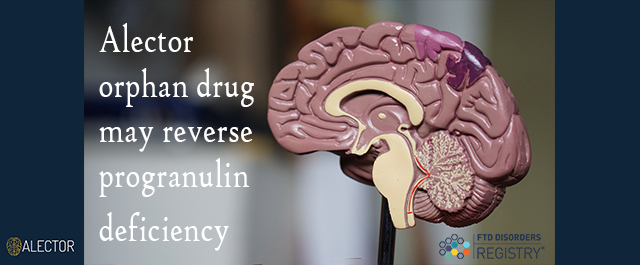PRESS & NEWS
Orphan Drug May Reverse Progranulin Deficiency

AL001 was seen to be generally safe and well-tolerated based on the results of the Phase 1 portion of the INFRONT clinical study.
AL001 was seen to be generally safe and well-tolerated based on the results of the Phase 1 portion of the INFRONT clinical study.
Alector, Inc. recently reported positive data from a subset of patients in its INFRONT clinical study the orphan drug AL001. AL001 is being evaluated to treat patients with frontotemporal dementia with a granulin mutation (FTD-GRN).
The study data was presented in July at the 2019 Alzheimer's Association International Conference (AAIC) by Robert Paul, M.D., Ph.D., chief medical officer of Alector.
“One of the main genetic drivers of FTD is a loss of function mutation in the progranulin gene where a 50 percent or more decrease in the level of progranulin compared to normal levels invariably leads to the disease,” Dr. Paul explained. “Our initial findings in this study show that treatment with AL001 is able to restore the level of progranulin in FTD-GRN patients back to the normal range.
“The good tolerability and safety observed, and promising progranulin response in the first four patients, support advancing AL001 to a Phase 2 study in the second half of this year for the treatment of FTD-GRN patients,” he said.
The summary of clinical data presented at AAIC included:
- Data presented was from 50 healthy volunteers and four patients with FTD-GRN.
- Based on the initial findings in the study, AL001 was seen to be generally safe and well-tolerated up to the highest dose level.
- Data showed that AL001 elicited a dose-dependent increase in PGRN levels in both plasma and cerebrospinal fluid (CSF) of healthy volunteers and FTD-GRN patients. Specifically, AL001 tripled the level of PGRN in the plasma and doubled the level of PGRN in the CSF of both asymptomatic and symptomatic FTD-GRN patients, restoring the level of PGRN back to the normal range.
- A Phase 2 clinical trial in FTD-GRN patients is expected to start in the second half of 2019.
About Frontotemporal Dementia (FTD)
FTD is a rapidly progressing and severe form of dementia found most frequently in individuals less than 65 years old at the time of diagnosis. It affects 50,000 to 60,000 individuals in the United States and approximately 110,000 individuals in the European Union, with additional prevalence in Asia and Latin America. There is currently no approved treatment available for FTD patients.
There are multiple heritable forms of FTD. FTD-GRN patients represent 5 percent to 10 percent of all patients with FTD. Mutation in a single copy of progranulin leads to a 50 percent or greater decrease in the level of progranulin and invariably leads to the development of FTD.
To date, researchers have identified more than 70 inherited loss of function mutations in the progranulin gene that lead to FTD.
About the INFRONT Clinical Study
The INFRONT clinical study is a Phase 1/1b study investigating the safety, tolerability, pharmacokinetics, and pharmacodynamics of intravenously administered AL001 in healthy volunteers and frontotemporal dementia patients with a progranulin mutation (FTD-GRN).
The study is designed to assess single and multiple doses of AL001 and measure the levels of progranulin, a disease-specific biomarker, in plasma and in cerebrospinal fluid.
For more information on the INFRONT clinical study, visit www.clinicaltrials.gov using identifier NCT03636204.
Alector, Inc. (Nasdaq: ALEC) is a clinical stage, biotechnology company pioneering immuno-neurology.
Together we can find a cure for ftd
The FTD Disorders Registry is a powerful tool in the movement to create therapies and find a cure. Together we can help change the course of the disease and put an end to FTD.
Your privacy is important! We promise to protect it. We will not share your contact information.



